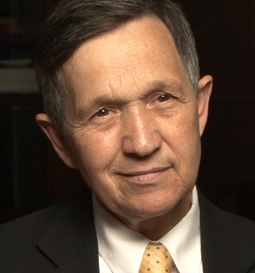 | |
| Dennis Kucinich | |
As Dennis Kucinich knows all to well, prominent politicians in Washington who stand up for the little guy are thought to interrupt the status quo. Kucinich is part of a rare breed in Washington who cannot be bought off by the wrong people, a noble quality that has made him a local hero in his Congressional district of Ohio, but one that has red flagged him as a troublemaker on Capitol Hill, albeit a highly respected one.
As Chairman of the Subcommittee on Domestic Policy in Congress, Dennis Kucinich has focused much of his recent efforts on preventing the Wall Street bailout from becoming an early Christmas for greedy undeserving CEOs. Kucinich insists on making sure banks play fair with their newfound funds stating, “It would be an affront to taxpayers and shareholders alike if Wall Street executives cashed in on the bailout. We must prevent bailout funds from being diverted directly or indirectly to bonuses and exorbitant compensation packages.”
Our conversation took place just days after Barack Obama was announced as the next President of the United States and Democrats gained majority in the House and in the Senate. Kucinich was full of energy about the possibilities that lay ahead for his party and his high hopes for a Barack Obama administration.
Dennis Kucinich has single payer universal healthcare on the brain which will no doubt create a healthy challenge for President-elect Barack Obama within The House of Representatives. As he stated several times during our interview, Kucinich is also determined to mobilize Democrats towards viable, affordable and clean forms of renewable energy for our country. He believes that the President-elect has an unprecedented opportunity to steer us toward clean renewable energy, asserting that President-elect Obama "is going to take a page from Franklin Roosevelt" in his pursuits to put Federal Government back on the side of all American citizens.
PR.com (Allison Kugel): You must be pretty excited that your state finally came through for the Democrats in this election.
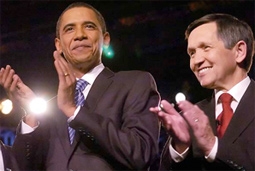 | |
| Barack Obama & Dennis Kucinich | |
Dennis Kucinich: Ohio has been trending Democrat for the last few years with the Democratic sweep in 2006. We’ve added more members of Congress in the party. The Barack Obama victory was really the result of efforts that have been put in place for the last couple years, including the Secretary of State’s office which was really crucial. You remember in 2004 the Republican Secretary of State was also a co-chair of President [Bush’s] re-election committee, and used many devices in order to frustrate voter turnout, particularly in Democratic areas.
PR.com: Is that a fact, or speculation?
Dennis Kucinich: That is a fact. That is not disputable. There’s been all kinds of studies and public hearings on that.
PR.com: Did those voter suppression tactics that were used in Ohio in 2004 mainly take place in financially underprivileged and minority neighborhoods?
Dennis Kucinich: They were having it primarily in minority districts. This was one of the reasons why [Congresswoman] Stephanie Tubbs Jones and I were involved in objecting to the approval of the Electoral College. From Ohio, she and I and a few other members of Congress objected to the count in the Electoral College because we felt that the election results in Ohio were because of inappropriate conduct on the part of the Secretary of State.
PR.com: How were those kinds of voter suppression tactics thwarted this time around?
Dennis Kucinich: There were thousands of attorneys who were present and who were trained as election monitors by the Barack Obama campaign. And the Secretary of State made sure that it was a fair election. She wasn’t there as an advocate. She was there to make sure the election laws were followed fairly for all parties, which is really the appropriate role for the Secretary of State. They can’t be in a position of determining who should get the advantage in voting.
PR.com: Was this something that was going on for decades, but the public just got wise to it with all of the mystery surrounding the two Bush elections?
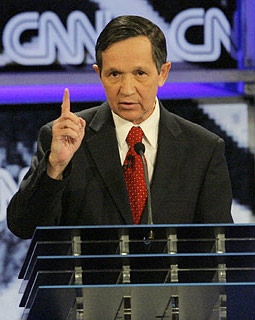 | |
| Dennis Kucinich | |
Dennis Kucinich: It started with Florida in 2000. Most people who are fair-minded know the election was stolen in 2000. But that was in Florida. The reprise was in Ohio. But, now this year we had a fair election, at least in Ohio. A fair election without any attempt to block anyone from voting created the circumstances that were right for the best campaign to win.
PR.com: Before the election you were quoted as saying, “If Obama wins, he is going to take a page from Franklin Roosevelt.” How so?
Dennis Kucinich: Well, I suggest that he should, because Franklin Roosevelt set forth a New Deal at a time when America was in dire financial straits. Coming out of the Depression he understood the importance of priming the pump of the economy, of putting people back to work, of re-building the infrastructure, of initiating social security and of creating protection for the marketplace so that people could be assured that their investments would be protected. Roosevelt was widely credited with saving Capitalism and he did it with an economic agenda based on social justice and economic justice. I think President-elect Obama, if he is going to be successful and if the Democrats are going to gain the public confidence and trust which I think we’re capable of gaining, we can only do it if we have a powerful economic agenda which includes putting millions of people back to work. [We must] re-build America’s infrastructure: our roads, our bridges, our water systems and our sewer systems, putting millions more to work. We have to re-build a new energy infrastructure with wind and solar micro-technologies that can be manufactured in America. We have to re-build our basic manufacturing, steel, automotive, aerospace and shipping capacities in order to make things in America again. All these things will help prime the pump of the economy and stimulate the economy.
PR.com: We have such a huge tangled knot of problems right now. When President-elect Obama takes office in January what should be his first major step to stimulate this economy? Should it be immediately withdrawing troops from Iraq, should it be immediately tackling healthcare reform? Where should the money come from to get us back on track?
Dennis Kucinich: Let me set the stage to answer this question by pointing out something that is right now acknowledged. President Bush asked for Congress to pass this bailout of 700 billion dollars, borrowing money from the banks at interest to give to the banks. The banks offload their toxic debts and/or hoard the money, and/or use the money to buy other banks. There is still a credit freeze. The bailout has not worked. The markets recognize that. The markets have not responded to the bailout in any appreciable way. There’s a roller coaster on Wall Street because there’s really no confidence in what the government has done; or in The Treasury Department, which is picking winners and losers, which is not an appropriate role for government. Having said that, ever since the money system was privatized in 1913 through The Federal Reserve Act the banks have had the ability to spend money into circulation. They basically create money out of thin air. That has been used to fuel the kind of podzi scheme-like speculation that has resulted in this housing bubble. The consequent bursting of it has revealed the underlying hollowness of the way our monetary system works. What President-elect Obama is going to have to do is to prime the pump of the economy by not borrowing money from the banks anymore, but spending the money into circulation for specific public goods. That is, for re-building infrastructure and putting millions of people back to work, for education, for healthcare and for a new energy infrastructure. When you do that you cause economic activity at the base of the society and it percolates up. He’s going to have to consider a different economic model. Ronald Reagan introduced Trickle Down Economics. The trickle never got down.
PR.com: And, trickle down has failed time and time again since then.
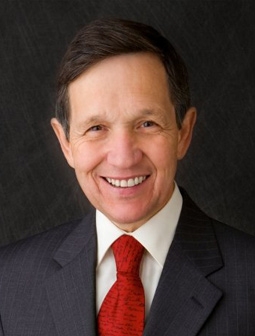 | |
| Dennis Kucinich | |
Dennis Kucinich: Oh, absolutely. It’s actually a charade because it implies that there’s going to be a broad based benefit from giving breaks to the top one percent. The Reagan model is that you accelerate wealth upwards and somehow the money is going to get through to every level and class in society. Well, that doesn’t work. As a matter of fact, what’s happened from Reagan up through Bush, with only brief interruption during the period of the Clinton Presidency, you’ve had government serve as an engine to re-distribute the wealth upwards, quite efficiently by the way. It has been re-distributed upwards in the following areas: in the tax system where the top one percent got most of the gains, in the healthcare system where the insurance companies are making huge amounts of money from the mass of the American people, in our energy policies where the oil companies take money from the mass of the American people and accelerate it upwards while frustrating the development of alternative energy, in war which is a huge vehicle for re-distributing wealth upwards to defense contractors, in our banking system, in the market… everything has been about distributing wealth upwards with the thought that it’s going to percolate down. What that’s left us with is a hollowed out economy and millions of people unemployed. There are fifty million people without any healthcare and another fifty million people who are underinsured. Millions of people have already lost their homes and millions more are ready to lose their homes in adjustable rate mortgages. So much for Reaganomics! President Obama cannot repeat the failed economics models of Presidents Reagan and Bush.
PR.com: Tell me if this is a true or false statement: Lobbyists in Washington are the root of all evil.
Dennis Kucinich: Think of Government as a tree. Trees have many roots. It’s one of the main roots, but it’s not the whole thing. Lobbyists in Washington are really a symptom of an underlying problem in governance where interest groups, with their resources, often trump the public interest because they’re able to buy favors with the money they give in campaigns. The antidote to that would be to have a public finance system where there would be no room for privately financed elections. You have to get beyond the Buckley vs. Valeo Supreme Court decision (1976 ruling which determined that spending money to influence elections is a form of constitutionally protected free speech) in order to do that. We need to really look at a constitutional amendment for public financing [in order] to have a government we can call our own. Apropos of your observation I’ll tell you this, if you look at when China Trade passed, and I saw this myself, there were four or sometimes five lobbyists for every single member of Congress. There were thousands of lobbyists to pass China Trade which really set the stage for the collapse of American manufacturing because they just move everything over to China and take advantage of their cheap labor. There’s no worker’s rights, no human rights, no environmental quality principles.
PR.com: China is also bringing some dangerous products into the United States.
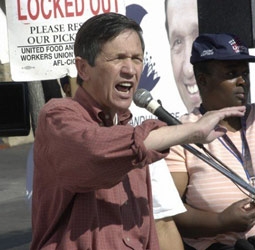 | |
| Dennis Kucinich | |
Dennis Kucinich: That’s true, but that’s because of a lack of regulation. Those two things went hand in hand; no protections in trade agreements and then you break down the regulatory structure, and who’s to know. I don’t blame the Chinese. I blame our government for not standing up for the American consumers, and for consumers in China as well. So, where we are today is that President-elect Obama has a great opportunity to make the kind of structural changes that will cause all Americans to once again find a way to enjoy prosperity; to have a home or to stay in their home, to have a job, for their children to have education, to have healthcare and to see the business of America finally restored through our capacity to make things again.
PR.com: What are your thoughts on the Republicans’ witch hunt for so-called Socialists? Anybody who speaks up for federally subsidized programs of any kind, you’re labeled a Socialist by the Republican Party, including yourself.
Dennis Kucinich: Name calling doesn’t get you anywhere. At this point in our political development it’s almost idiotic. The label doesn’t mean anything. The question is, do you stand for the public interest or do you stand for the private interest? Franklin D. Roosevelt was labeled a Socialist because he stood for social security. Well, if these people who are calling those who stand for a public purpose Socialists, well they ought to give up their social security. They ought to give up their Medicare. As a matter of fact, they ought to pick up their own garbage, put out their own fires…
PR.com: Police their own streets…
Dennis Kucinich: Yeah, put a badge on and be their own policemen. As a matter of fact, (laughs) they ought to carry a shovel in their truck with some asphalt and cover their own truck holes.
PR.com: Well, the irony is that welfare is ok for the wealthy, but it’s not ok for the poor.
Dennis Kucinich: George Bush did more for Socialism than any President in the history of this country with a 700 billion dollar bailout to the banks. He socialized Wall Street. Wow! How ‘bout that? Did anybody ever think they would hear George Bush and Karl Marx mentioned in the same breathe?
PR.com: I think George W. Bush was trying to cover his own butt, because I think he had a hand in some of the making of our current circumstances.
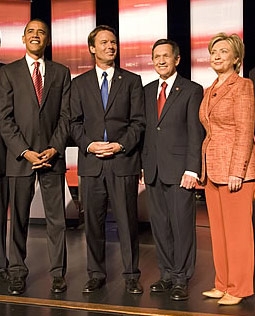 | |
| Barack Obama, John Edwards, Dennis Kucinich, & Hillary Clinton | |
Dennis Kucinich: But, who’s done more for Socializing Wall Street than George W. Bush? I would think that he should be proud of his activities if he’s about Socialism. But, this isn’t about “isms.” This is about the American peoples’ ability to survive. This idea of left and right… as I said in my speech at The Democratic Convention, it’s not about left or right. It’s about up or down (laughs). That’s the real defining thing. Are you up or are you down? A lot of people are down now. The American people are pretty much not ideological. When people take that office of President they ought to have a philosophical basis of where they’re from and that’s what Reagan had. I don’t think that Bush was really ideological. He was more fear-driven and opportunistic, but he wasn’t really somebody who believed in much of anything.
PR.com: Will you be a strong ally in Congress for President-elect Barack Obama?
Dennis Kucinich: There are places where I know I can help him. I’d take it an issue at a time. I certainly see the opportunity that’s there for him, and I’d be happy to help him in those areas where we’re talking about the broad economic reforms that need to be made in order to protect the American middle class, in order to restore an opportunity for healthcare and in order to restore our manufacturing potential.
PR.com: You had been fighting for universal single payer healthcare. In contrast, President-elect Barack Obama wants to stay more within the parameters and the current paradigm of what we have now, with private health insurance, though he wants to make it more affordable. Do you think that perhaps you and other members of Congress who subscribe to your healthcare philosophy could sway him?
Dennis Kucinich: John Conyers and I worked together and we got over 90 members of Congress to sign up for HR 676, the Medicare for All Bill. I think President Obama will find that by and large the American public is not able to financially tolerate increased premiums, co-pays and deductibles. For all of his good intentions, he may find that his plan would end up subsidizing the insurance companies at the expense of the broad base of the American people. I don’t think he really wants to do that, but once he looks at the practical function of his healthcare plan he may see that the greed of the insurers is so insatiable that there is no way to stop them from increasing premiums while the government is trying to provide some kind of subsidy. That’s the underlying problem with remaining in a for-profit system. So, I certainly want to help him in a transition away from what we have now. The final destination for [his current plan] does not look too good. There’s going to be a lot of gaps and holes in the road and a lot of people left behind, and I don’t think he really wants to do that. He’s going to need help from Congress. A President is going to need help to get any kind of economic or social agenda passed, and so my job is going to be to try to rally support for him in those areas where we agree.
PR.com: Should his healthcare plan remain the same, will you vote for it?
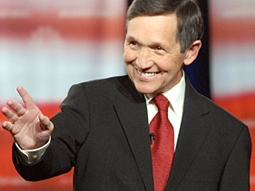 | |
| Dennis Kucinich | |
Dennis Kucinich: Nothing remains the same. Once you start putting things through Congressional committees, you can’t predict how it’s going to come out. What I found out a long time ago, getting into Congress, is be careful about predicting how you’re gonna vote on something until you see the final product. And, sometimes you don’t even see the final product, like [with] The Patriot Act. I was probably the only one who read the Bill. I voted against it because I read it.
PR.com: Thoughts on Rahm Emanuel as Barack Obama’s pick for Chief of Staff?
Dennis Kucinich: The President has the right to pick whoever he wants. Frankly, barring any disclosure of something that is shocking and new, he should have the right to pick whoever he wants. That’s what being President’s about. People picked him because they felt that they could trust his judgment. Well, you know what? This is his time to show it. He should be given the chance to be able to move the country in the way he sees fit. Now, we can disagree as a member of Congress, but when he starts picking people for jobs, that’s his choice.
PR.com: Do you have a personal opinion of Congressman Emanuel?
Dennis Kucinich: He’s very effective, but there’s a bigger question here. Should the President of the United States have the opportunity to pick who he feels he needs in order to run his administration? The answer has to be yes. Whether I agree with him on any particular choice is irrelevant.
PR.com: What I find ironic is that during the campaigns I heard a lot of chatter among Jewish people who were scared by the McCain campaign into thinking that perhaps Obama would not be an advocate of Israel or of the Jewish people. McCain scared up a lot of Jewish votes in that regard. And, here Barack Obama has just made an Orthodox Jewish man with ties to Israel his Chief of Staff.
Dennis Kucinich: Again, I think it’s really important to give him a chance to be President of the United States with all that it means. We’ll have a chance to debate all of the issues down the road, but if he can’t pick his team then what does it mean to be President of the United States?
PR.com: That brings me to a vote in Congress I want to ask you about. The House voted 411 to 2 to call on the United Nations to charge Iranian President Mahmoud Ahmadinejad for violating the International Convention because he was making consistent verbal threats against the state of Israel. You were one of the two people who voted against charging Ahmadinejad. Why?
Dennis Kucinich: Because I think it’s much more productive to engage a person in a dialogue than it is to go to war against them. I read the New York Times translation of President Ahmadinejad’s comments, and it didn’t say anything about destroying Israel. It talked about getting rid of the regime. Look at The New York Times translation. That’s what I was referring to. I can’t be rolled on anything. I can’t be panicked or stampeded into a vote without opening my eyes. I read it. They just wouldn’t let me enter it into the Congressional record because it was his words. Think about this, there was an objection to entering his words that were in The New York Times. You would think that they would have some credibility. But the Congress didn’t want to hear it. We don’t need to go to war against Iran. That would be a disaster for Israel.
PR.com: You think that was a prelude to a war with Iran?
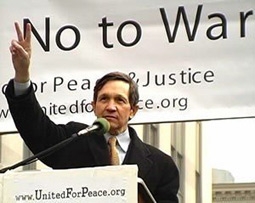 | |
| Dennis Kucinich | |
Dennis Kucinich: There’s no question that, that’s a prelude to a war. And, a war against Iran is a disaster for Israel and a disaster for The United States as well. Anybody who doesn’t understand that doesn’t understand the way the world works. We need to find a way to bring Iran fully within the community of nations. The U.S.’s commitment to the survival of Israel need never be in doubt. But, the diplomatic policies of the Bush administration were a nightmare for Israel because it actually made Israel less safe. Someone could say, “Well, we’re there with our arms.” No. You don’t make a country safe just by the force of arms.
PR.com: Do you think President-elect Obama is naïve, or do you think he is on point to think that he could sit down for peace talks in the Middle East?
Dennis Kucinich: It’s a different world today. The world is interconnected, it’s interdependent. No one can stand outside the community of nations; not North Korea, not Iran, no one. So, we have to approach it with the idea that we’re all in this together. If we start saying that someone is less than, or beneath the grace of universal possibility, then we have to start looking at ourselves. It’s funny, in all this stuff, I’m one of the few people who ever raised the question about the fact that a million innocent Iraqis died at the hands of the Bush administration. How does that look to the world? Where’s our moral compass here? How can we demand one level of conduct from nations in the world when we don’t demand it of our own leaders?
PR.com: Do you think Barack Obama’s presidency will usher in a new era where we don’t go to war for oil?
Dennis Kucinich: He has that opportunity. I led the effort in the United States House of Representatives against the war [in Iraq]. I was the first one to point out that it was connected to oil. I was chastised on Meet the Press for mentioning that. I got into this debate with Richard Perle. I got into arguments inside the Democratic Caucus when I pointed out that the efforts of the Bush Administration to force the passage of a Hydrocarbon Act into the Iraq Parliament were simply an effort to privatize Iraq’s oil. I’ve been on this thing from the beginning. I can tell you that President Obama has an opportunity to take a new direction here. Whether he will or not remains to be seen. But, there is no question that he probably has the best opportunity to bring about structural changes in the United States economy, and in our relationships with the nations of the world since Franklin D. Roosevelt.
PR.com: What about energy independence? If offshore drilling is not the answer, what do you suggest, and what are your thoughts on making us more energy independent?
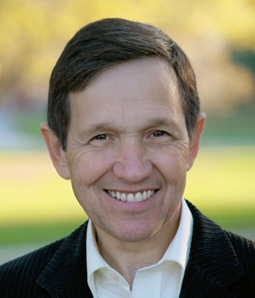 | |
| Dennis Kucinich | |
Dennis Kucinich: The central flaw in our energy policies started with Ronald Reagan where he did not let any appreciable amount of funds be brought forward for the development of alternative energy. This has been going on now for many years. Now we’re at the point where we have to create a new energy infrastructure. The proposal I’ve been floating, and I did it as a Presidential candidate, was for what I call a “Works Green Administration.” [This] would have the government be involved in helping [to create] incentive for the design, engineering, production, manufacturing and maintenance of wind and solar micro- technologies that would be installed in tens of millions of homes and businesses for the purpose of lowering energy costs and lowering our carbon footprint. These are the kinds of things that could help stimulate the economy and lower our consumption of hydro-carbon based energy. We’re going to have to do that. Anybody that’s visited the northern climes can see the ice caps… I’ve been to Alaska and I’ve seen the ice caps melting. You see that the migration patterns have changed. You see people who have to wear sunglasses in the northern Polar Regions because of the hole in the ozone layer, and the ultraviolet light is threatening their vision and their skin. There are epidemiological changes, there are health changes that have taken place, there are climate changes and there are terrestrial changes. Al Gore documented it pretty well, and others have long before him. We have to do something about protecting the global climate. This is a great opportunity for us to make a new beginning. We can have more fuel efficient cars, we can promote mass transit, we can look at the products that we use to build homes and that we use for consuming various goods. This can be a grand, national effort and President-elect Obama is in a perfect position to lead it.
For more information on Congressman Dennis Kucinich from Ohio’s 10th district, visit www.kucinich.us.Labels:
--
Subscribe to emails from :
- Better World News: http://at7l.us/mailman/listinfo/bwn_at7l.us
- Learning News - children learning, how mind works: http://at7l.us/mailman/listinfo/learn_at7l.us
- Health News - better ways of healthy living: http://at7l.us/mailman/listinfo/health_at7l.us
- Good Morning World - Robert & Barbara Muller's daily idea-dream for a better world: http://www.goodmorningworld.org/emaillist/#subscribe
or send a request a subscription to any of the three lists here.
View these blogs:
- Better World News
- Learning News
- Health News
- Good Morning World
No comments:
Post a Comment